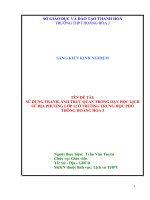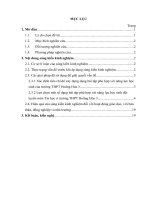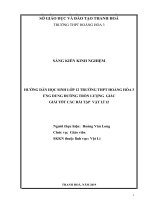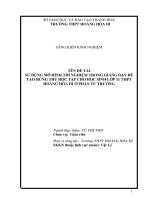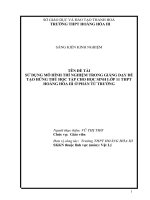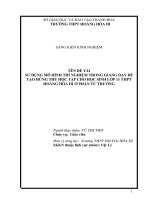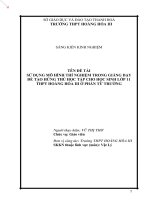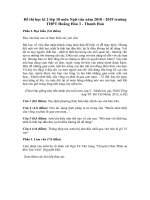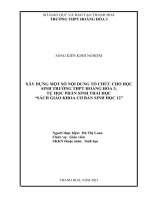Đề 46 - Thpt Hoằng Hóa 3.Docx
Bạn đang xem bản rút gọn của tài liệu. Xem và tải ngay bản đầy đủ của tài liệu tại đây (0 B, 8 trang )
SỞ GD & ĐT THANH HÓA
ĐỀ KHẢO SÁT CHẤT LƯỢNG THPT
TRƯỜNG THPT HOẰNG HÓA 3
Bài thi: TIẾNG ANH
(Đề thi gồm 04 trang)
Thời gian làm bài: 60 phút (không kể thời gian phát đề)
ĐỀ 46
Họ và tên thí sinh: ………………………………………………………… SBD……………………….
Mark the letter A, B, C, or D on your answer sheet to indicate the word whose underlined part differs from
the other three in pronunciation in each of the following questions.
Question 1: A. father B. anything
C. another
D. although
Question 2: A. sacrifice B. determine
C. involve
D. different
Mark the letter A, B, C, or D on your answer sheet to indicate the word that differs from the other three in
the position of primary stress in each of the following questions.
Question 3: A. obey
B. forbid
C.publish
D. donate
Question 4: A. efficient
B. addicted
C. historic
D.numerous
Mark the letter A, B, C, or D on your answer sheet to indicate the correct answer to each of the following
questions.
Question 5:The new illness, ______ by a doctor in Nigeria, has not yet beennamed.
A. was discovered
B. was discovering
C. discovering
D. discovered
Question 6:These books aren’t yours, ____________?
A. are these
B. aren’t these
C. are they
D. aren’t they
Question 7:The nurses are the most important element in helping to keep these children safe and ____during
the winter months.
A. voice
B. noise
C. saving
D. sound
Question 8:The manager is directly responsible________the efficient running of the office
A. about
B. for
C. at
D. in
Question 9:Cinema ________ would be more accepting of this sort of advertising.
A.viewers
B.audiences
C.spectators
D.witnesses
Question 10:When we looked out of the window we saw the mountains covered with ______snow.
A. a
B. an
C. rhe
D. Ø (no article)
Question 11:Production values are _____, with the whole book printed on heavy, glossy paper.
A.impress
B.impressive
C.impression
D.impressively
Question 12:She invited loads of friends to her party, but only a handful of them _________.
A. brought up
B.turned up
C. got up
D. looked up
Question 13:When I opened the door yesterday, the wind ______ very hard.
A. blows
B. will blow
C. was blowing
D. blew
Question 14: I’m sorry about the delay, but I will be back ________.
A. after I had checked thisB. as soon as I have checked this
C. while I was checking this
D. when I checked this
Question 15: If we could all ______ an effort to keep this office tidier, it would help.
A. make
B. take
C. have
D. move
Question 16:If you keep on driving like that, it'll only be a ____ of time before you have an accident.
A.problem
B.matter
C.trouble
D.situation
Question 17:We hope that the new sports centre ________ by the Mayor next month.
A. opens
B.will open
C. will be opened
D.was opening
Question 18:We thought we were going to arrive late, but somehow we managed ___ there in time
A.to get
B.get
C.to getting
D.getting
Question 19:My sister thinks she's _______ than me, but I don't agree!
A.intelligent
B.most intelligent
C.the most intelligent
D.more intelligent
Mark the letter A, B, C, or D on your answer sheet to indicate the word(s) CLOSEST in meaning to the un derlined word(s) in each of the following questions.
Question 20:Better training policies and new technologies are aiding disabled people in the workplace
A. changing
B.helping
C.moving
D.upgrading
Question 21:Ever since the advent of hi-fi, nobody has paid real money for a real band in this country.
A. import
B. disappearance
C. arrival
D. invitation
Mark the letter A, B, C, or D on your answer sheet to indicate the word(s) OPPOSITE in meaning to the
underlined word(s) in each of the following questions.
Question 22:Some senators reacted angrily to the president's remarks.
A. aggressively
B.luckily
C. surprisingly
D.friendly
Question 23:It is important to keep in touch with the latest research.
A. lose contact with
B. look forward to
C. pay attention to
D. be interested in
Mark the letter A, B, C, or D on your answer sheet to indicate the option that best completes each of the following exchanges.
Question 24:Hoa’s father is asking her about her new job in the bank.
- Hoa’s father: “Do you enjoy your new job in that bank?” - Hoa: “__________. It’s a little boring.”
A. Yes, I did.
B.Thank you for asking. C.Not very much.
D. Why not enjoying?
Question 25:Geroge and Linda are talking about the use of mobile phones.
- George: “I think it is a good idea to allow students to use their phones in class.”
- Linda: “ _______. They tend to be distracted and can’t focus on lessons.”
A. Surely you’re right.
B. I’m not with you.
C. I couldn’t agree with you more.
D. I’m fine.
Read the following passage and mark the letter A, B, C, or D on your answer sheet to indicate the correct
word or phrase that best fits each of the numbered blanks.
Research on the impacts of mass media began in the 1920s and 1930s, with the rise of muckraking
journalism—elites became concerned about the effects of investigative reporting in magazines such as
McClure's on political decision-making. Mass media became a prominent (26) ________ of study in the 1950s
after television became widely available, and academic departments dedicated to communication studies were
(27) ________. These early studies investigated the cognitive, emotional, attitudinal, and behavioural effects of
media on both children and adults; in the 1990s, researchers began to use those earlier studies to draw up
theories (28) ________ concerned the use of media today.
In the 1970s theorists such as Marshall McLuhan and Irving J. Rein warned that media critics needed to
watch how media affects people. Today, this remains a key concern; (29) ________ attention has been paid, for
example, to the impact on the 2016 election of false messaging distributed on social media. (30) ________, the
myriad forms of mass communication available today have also encouraged some researchers to begin to
investigate "what people do with media."
Question 26: A. career
B. shape
C. focus
D. cycle
Question 27: A. created
B. claimed
C. expressed
D. struggled
Question 28: A. who
B. which
C. when
D. where
Question 29: A. every
B. another
C. much
D. many
Question 30: A.Therefore B. Although
C. Because
D.However
Read the following passage and mark the letter A, B, C, or D on your answer sheet to indicate the correct
answer to each of the questions.
Internet of Things (IoT) is considered the third revolution of the computer, after the first revolution of
bringing computing to governments and big companies and the second one to the public via PC and
smartphone. IoT aims at baking computing power into everything else via countless tiny chips, which will
enable them to calculate, process information and decide, by gathering and analysing troves of data about the
product, process and customers. A computerised world will allow its inhabitants to quantify and analyse all
manner of things that used to be intuitive and inexact. The direct market size of IoT will be $320 billion by
2027, according to GSMA. Although it is hard to predict the exact impact of IoT on economics, it is believed to
be over $500 billion by 2021 and $1 trillion by 2025.
Expanding from the computer to everything else, IoT projects are found to be very fragmented. Some
IoT projects are led by the government, such as smart traffic systems, to reduce waiting times or mandate the
use of smart meters. Some projects are utilised in the industry with the aims to improve productivity. One
example is the use of advanced algorithms to predict the downtime of machines and schedule maintenance
before it happens. Other IoT projects focus on consumers; one of the hot topics is the smart home, including
smart speakers, smart lighting, remote-controlled appliances etc.
Question 31: What could be the best title for the passage?
A. The first revolution of computing
B. Benefits of a computerised world
C. IoT projects around the world
D. IoT Applications: Great Opportunities to Come
Question 32: The word “which” in paragraph 1 refers to ______.
A. computing power
B. everything
C. tiny chips
D. information
Question 33: According to paragraph 1, people around the world can quantify and analyse all manner of things
exactly thanks to ______.
A. the revolution of big companies
B. a computerised system
C. the impacts led by the government
D. the direct market size
Question 34: The word “fragmented” in paragraph 2 is closest in meaning to ______.
A. divided
B. united
C.embarrassed
D. interested
Question 35: According to the passage, which of the following is NOT mentioned as an application of IoT
projects?
A. Smart traffic systems
B. Prediction of industry development
C. Productivity improvement
D. Remote-controlled appliances
Read the following passage and mark the letter A, B, C, or D on your answer sheet to indicate the correct
answer to each of the questions.
Whereas currents arise in areas of Earth where water is "supposed" to be, floods, by definition, do not. They
often occur in valleys or on coastlines and can be caused by various natural and man-made factors. Among
natural causes are rains and the melting of snow and ice, while human-related causes can include poor
engineering of irrigation or other water-management systems as well as the bursting of dams. In addition, the
building of settlements too close to rivers and other bodies of water that are prone to flooding has resulted in the
increase of human casualties from flooding over the centuries.
In terms of natural causes, changes in weather patterns typically are involved—but not always. For example,
a low-lying coastal area may be susceptible to flooding at times when the ocean reaches high tide. On the other
hand, such weather conditions as low barometric pressure and high winds also can bring about heightened high
tides. Additionally, floods can be caused by earthquakes and other geologic phenomena that have no relation to
the weather.
From ancient times people have located settlements near water. This settlement pattern resulted from the
obvious benefits that accrued from access to water, and even though flooding was naturally a hazard, in some
cases flooding itself was found to be beneficial. For the ancient Egyptians, the yearly cycles of flooding on the
part of the Nile caused the deposition of rich soil, which played a major part in the fertility of the farmlands
that, in turn, made possible the brilliant civilization of the pharaohs.
Along with these benefits, however, ancient peoples learned to fear the changes in weather and other
circumstances that could bring about sudden flooding. This feeling is reflected, for instance, in Jesus' parable
about the wise and foolish house builders. In the parable, a favourite Sunday school topic, the foolish man
builds his house upon the sand, so that when the floods come, they sweep away his household. On the other
hand, the wise man builds his house on rock, so that his household withstands the inevitable flood—an
illustration about spiritual values that likewise reflects a reality of daily life in the ancient Near East.
Question 36: Which best serves as the title for the passage?
A. Changes in Weather
B. Settlements Near Water
C. House Builders
D. Flooding
Question 37: The word “susceptible” in paragraph 2 is closest in meaning to ______.
A. cautious
B. vulnerable
C. immodest
D. precious
Question 38: In paragraph 1, living too close to rivers and other bodies of water has resulted in ______.
A.increasing human casualties from flooding
B. currents arising in many areas of Earth
C. floods due to man-made factors
D. the bursting of dams
Question 39: The word “hazard” in paragraph 3 is closest in meaning to ______.
A.danger
B. product
C. direction
D. context
Question 40: The word “they” in paragraph 4 refers to ______.
A. circumstances
B. builders
C. floods
D. values
Question 41: Which of the following is NOT true, according to the passage?
A.Poor engineering of irrigation is a human-related cause to floods.
B. Floods are not caused by phenomena not related to the weather.
C. Yearly flooding causes the deposition of rich soil.
D. The changes in weather could bring about sudden flooding.
Question 42: Which of the following can be inferred from paragraph 4?
A. In ancient time, flooding brought about a lot of benefits.
B. Even a foolish house builders could make a house for himself.
C. Flooding was inevitable, and people of ancient time learnt to get used to it.
D. Floods swept away the household though the owner was a wise man.
Mark the letter A, B, C, or D on your answer sheet to indicate the underlined part that needs correction in
each of the following questions.
Question 43:There were scenes of great joy as the hostages were re-united with her families.
A. There
B. as
C. re-united
D. her
Question 44:I had to buy a new washing machine as it would not have been economic to get
it repaired.
A. had to
B. as
C. economic
D. repaired
Question 45: The national soccer team make several attempts to win the matchyesterday.
A. make
B. attempt
C. to win
D. match
Mark the letter A, B, C, or D on your answer sheet to indicate the sentence that is closest in meaning to each
of the following questions.
Question 46:It is against the law to drive on the left in Vietnam.
A. You must not drive on the left in Vietnam.
B. You may drive on the left in Vietnam.
C. You will be able to drive on the left in Vietnam.
D. You can drive on the left in Vietnam.
Question 47:“I was intending to meet you tomorrow” she said.
A. She told me she was intending to meet me tomorrow.
B. She told me she had intending to meet me the next day.
C. She told me she had been intending to meet me tomorrow.
D. She told me she had been intending to meet me the next day.
Question 48:She last bought a new mobile phone 3 years ago.
A. She hasn’t bought a new mobile phone for 3 years.
B. She didn’t buy a new mobile phone 3 years ago.
C. She has bought a new mobile phone for 3 years.
D. She bought a new mobile phone for 3 years.
Mark the letter A, B, C, or D on your answer sheet to indicate the sentence that best combines each pair of
sentences in the following questions.
Question 49:They work so slowly. I really want the work finished faster.
A. Unless they work so slowly, they can’t finish the work faster.
B. While they work so slowly, I really want the work finished faster.
C. I wish they didn’t work so slowly and could finish the work faster.
D. Now that they work so slowly, they can finish the work faster.
Question 50: I had turned on my new iPad Pro. There was a strange noise right after that.
A. As soon as there was a strange noise, I turned on my new iPad Pro.
B. Scarcely had I turned on my new iPad Pro when there was a strange noise.
C. Hardly I had turned on my new iPad Pro, there was a strange noise.
D. No sooner I had turned on my new iPad Pro than there was a strange noise.
--------------------THE END--------------------
SỞ GD & ĐT THANH HÓA
ĐỀ KHẢO SÁT CHẤT LƯỢNG THPT
TRƯỜNG THPT HOẰNG HÓA 3
Bài thi: TIẾNG ANH
(Đề thi gồm 04 trang)
Thời gian làm bài: 60 phút (không kể thời gian phát đề)
ĐỀ 46
Họ và tên thí sinh: ………………………………………………………… SBD……………………….
Mark the letter A, B, C, or D on your answer sheet to indicate the word whose underlined part differs from
the other three in pronunciation in each of the following questions.
Question 1: A. father B. anything
C. another
D. although
Question 2: A. sacrifice B. determine
C. involve
D. different
Mark the letter A, B, C, or D on your answer sheet to indicate the word that differs from the other three in
the position of primary stress in each of the following questions.
Question 3: A. obey
B. forbid
C.publish
D. donate
Question 4: A. efficient
B. addicted
C. historic
D.numerous
Mark the letter A, B, C, or D on your answer sheet to indicate the correct answer to each of the following
questions.
Question 5:The new illness, ______ by a doctor in Nigeria, has not yet beennamed.
A. was discovered
B. was discovering
C. discovering
D. discovered
Question 6:These books aren’t yours, ____________?
A. are these
B. aren’t these
C. are they
D. aren’t they
Question 7:The nurses are the most important element in helping to keep these children safe and ____during
the winter months.
A. voice
B. noise
C. saving
D. sound
Question 8:The manager is directly responsible________the efficient running of the office
A. about
B. for
C. at
D. in
Question 9:Cinema ________ would be more accepting of this sort of advertising.
A.viewers
B.audiences
C.spectators
D.witnesses
Question 10:When we looked out of the window we saw the mountains covered with ______snow.
A. a
B. an
C. rhe
D. Ø (no article)
Question 11:Production values are _____, with the whole book printed on heavy, glossy paper.
A.impress
B.impressive
C.impression
D.impressively
Question 12:She invited loads of friends to her party, but only a handful of them _________.
A. brought up
B.turned up
C. got up
D. looked up
Question 13:When I opened the door yesterday, the wind ______ very hard.
A. blows
B. will blow
C. was blowing
D. blew
Question 14: I’m sorry about the delay, but I will be back ________.
A. after I had checked thisB. as soon as I have checked this
C. while I was checking this
D. when I checked this
Question 15: If we could all ______ an effort to keep this office tidier, it would help.
A. make
B. take
C. have
D. move
Question 16:If you keep on driving like that, it'll only be a ____ of time before you have an accident.
A.problem
B.matter
C.trouble
D.situation
Question 17:We hope that the new sports centre ________ by the Mayor next month.
A. opens
B.will open
C. will be opened
D.was opening
Question 18:We thought we were going to arrive late, but somehow we managed ___ there in time
A.to get
B.get
C.to getting
D.getting
Question 19:My sister thinks she's _______ than me, but I don't agree!
A.intelligent
B.most intelligent
C.the most intelligent
D.more intelligent
Mark the letter A, B, C, or D on your answer sheet to indicate the word(s) CLOSEST in meaning to the un derlined word(s) in each of the following questions.
Question 20:Better training policies and new technologies are aiding disabled people in the workplace
A. changing
B.helping
C.moving
D.upgrading
Question 21:Ever since the advent of hi-fi, nobody has paid real money for a real band in this country.
A. import
B. disappearance
C. arrival
D. invitation
Mark the letter A, B, C, or D on your answer sheet to indicate the word(s) OPPOSITE in meaning to the
underlined word(s) in each of the following questions.
Question 22:Some senators reacted angrily to the president's remarks.
A. aggressively
B.luckily
C. surprisingly
D.friendly
Question 23:It is important to keep in touch with the latest research.
A. lose contact with
B. look forward to
C. pay attention to
D. be interested in
Mark the letter A, B, C, or D on your answer sheet to indicate the option that best completes each of the following exchanges.
Question 24:Hoa’s father is asking her about her new job in the bank.
- Hoa’s father: “Do you enjoy your new job in that bank?” - Hoa: “__________. It’s a little boring.”
A. Yes, I did.
B.Thank you for asking. C.Not very much.
D. Why not enjoying?
Question 25:Geroge and Linda are talking about the use of mobile phones.
- George: “I think it is a good idea to allow students to use their phones in class.”
- Linda: “ _______. They tend to be distracted and can’t focus on lessons.”
A. Surely you’re right.
B. I’m not with you.
C. I couldn’t agree with you more.
D. I’m fine.
Read the following passage and mark the letter A, B, C, or D on your answer sheet to indicate the correct
word or phrase that best fits each of the numbered blanks.
Research on the impacts of mass media began in the 1920s and 1930s, with the rise of muckraking
journalism—elites became concerned about the effects of investigative reporting in magazines such as
McClure's on political decision-making. Mass media became a prominent (26) ________ of study in the 1950s
after television became widely available, and academic departments dedicated to communication studies were
(27) ________. These early studies investigated the cognitive, emotional, attitudinal, and behavioural effects of
media on both children and adults; in the 1990s, researchers began to use those earlier studies to draw up
theories (28) ________ concerned the use of media today.
In the 1970s theorists such as Marshall McLuhan and Irving J. Rein warned that media critics needed to
watch how media affects people. Today, this remains a key concern; (29) ________ attention has been paid, for
example, to the impact on the 2016 election of false messaging distributed on social media. (30) ________, the
myriad forms of mass communication available today have also encouraged some researchers to begin to
investigate "what people do with media."
Question 26: A. career
B. shape
C. focus
D. cycle
Question 27: A. created
B. claimed
C. expressed
D. struggled
Question 28: A. who
B. which
C. when
D. where
Question 29: A. every
B. another
C. much
D. many
Question 30: A.Therefore B. Although
C. Because
D.However
Read the following passage and mark the letter A, B, C, or D on your answer sheet to indicate the correct
answer to each of the questions.
Internet of Things (IoT) is considered the third revolution of the computer, after the first revolution of
bringing computing to governments and big companies and the second one to the public via PC and
smartphone. IoT aims at baking computing power into everything else via countless tiny chips, which will
enable them to calculate, process information and decide, by gathering and analysing troves of data about the
product, process and customers. A computerised world will allow its inhabitants to quantify and analyse all
manner of things that used to be intuitive and inexact. The direct market size of IoT will be $320 billion by
2027, according to GSMA. Although it is hard to predict the exact impact of IoT on economics, it is believed to
be over $500 billion by 2021 and $1 trillion by 2025.
Expanding from the computer to everything else, IoT projects are found to be very fragmented. Some
IoT projects are led by the government, such as smart traffic systems, to reduce waiting times or mandate the
use of smart meters. Some projects are utilised in the industry with the aims to improve productivity. One
example is the use of advanced algorithms to predict the downtime of machines and schedule maintenance
before it happens. Other IoT projects focus on consumers; one of the hot topics is the smart home, including
smart speakers, smart lighting, remote-controlled appliances etc.
Question 31: What could be the best title for the passage?
A. The first revolution of computing
B. Benefits of a computerised world
C. IoT projects around the world
D. IoT Applications: Great Opportunities to Come
Question 32: The word “which” in paragraph 1 refers to ______.
A. computing power
B. everything
C. tiny chips
D. information
Question 33: According to paragraph 1, people around the world can quantify and analyse all manner of things
exactly thanks to ______.
A. the revolution of big companies
B. a computerised system
C. the impacts led by the government
D. the direct market size
Question 34: The word “fragmented” in paragraph 2 is closest in meaning to ______.
A. divided
B. united
C.embarrassed
D. interested
Question 35: According to the passage, which of the following is NOT mentioned as an application of IoT
projects?
A. Smart traffic systems
B. Prediction of industry development
C. Productivity improvement
D. Remote-controlled appliances
Read the following passage and mark the letter A, B, C, or D on your answer sheet to indicate the correct
answer to each of the questions.
Whereas currents arise in areas of Earth where water is "supposed" to be, floods, by definition, do not. They
often occur in valleys or on coastlines and can be caused by various natural and man-made factors. Among
natural causes are rains and the melting of snow and ice, while human-related causes can include poor
engineering of irrigation or other water-management systems as well as the bursting of dams. In addition, the
building of settlements too close to rivers and other bodies of water that are prone to flooding has resulted in the
increase of human casualties from flooding over the centuries.
In terms of natural causes, changes in weather patterns typically are involved—but not always. For example,
a low-lying coastal area may be susceptible to flooding at times when the ocean reaches high tide. On the other
hand, such weather conditions as low barometric pressure and high winds also can bring about heightened high
tides. Additionally, floods can be caused by earthquakes and other geologic phenomena that have no relation to
the weather.
From ancient times people have located settlements near water. This settlement pattern resulted from the
obvious benefits that accrued from access to water, and even though flooding was naturally a hazard, in some
cases flooding itself was found to be beneficial. For the ancient Egyptians, the yearly cycles of flooding on the
part of the Nile caused the deposition of rich soil, which played a major part in the fertility of the farmlands
that, in turn, made possible the brilliant civilization of the pharaohs.
Along with these benefits, however, ancient peoples learned to fear the changes in weather and other
circumstances that could bring about sudden flooding. This feeling is reflected, for instance, in Jesus' parable
about the wise and foolish house builders. In the parable, a favourite Sunday school topic, the foolish man
builds his house upon the sand, so that when the floods come, they sweep away his household. On the other
hand, the wise man builds his house on rock, so that his household withstands the inevitable flood—an
illustration about spiritual values that likewise reflects a reality of daily life in the ancient Near East.
Question 36: Which best serves as the title for the passage?
A. Changes in Weather
B. Settlements Near Water
C. House Builders
D. Flooding
Question 37: The word “susceptible” in paragraph 2 is closest in meaning to ______.
A. cautious
B. vulnerable
C. immodest
D. precious
Question 38: In paragraph 1, living too close to rivers and other bodies of water has resulted in ______.
A.increasing human casualties from flooding
B. currents arising in many areas of Earth
C. floods due to man-made factors
D. the bursting of dams
Question 39: The word “hazard” in paragraph 3 is closest in meaning to ______.
A.danger
B. product
C. direction
D. context
Question 40: The word “they” in paragraph 4 refers to ______.
A. circumstances
B. builders
C. floods
D. values
Question 41: Which of the following is NOT true, according to the passage?
A.Poor engineering of irrigation is a human-related cause to floods.
B. Floods are not caused by phenomena not related to the weather.
C. Yearly flooding causes the deposition of rich soil.
D. The changes in weather could bring about sudden flooding.
Question 42: Which of the following can be inferred from paragraph 4?
A. In ancient time, flooding brought about a lot of benefits.
B. Even a foolish house builders could make a house for himself.
C. Flooding was inevitable, and people of ancient time learnt to get used to it.
D. Floods swept away the household though the owner was a wise man.
Mark the letter A, B, C, or D on your answer sheet to indicate the underlined part that needs correction in
each of the following questions.
Question 43:There were scenes of great joy as the hostages were re-united with her families.
A. There
B. as
C. re-united
D. her
Question 44:I had to buy a new washing machine as it would not have been economic to get
it repaired.
A. had to
B. as
C. economic
D. repaired
Question 45: The national soccer team make several attempts to win the matchyesterday.
A. make
B. attempt
C. to win
D. match
Mark the letter A, B, C, or D on your answer sheet to indicate the sentence that is closest in meaning to each
of the following questions.
Question 46:It is against the law to drive on the left in Vietnam.
A. You must not drive on the left in Vietnam.
B. You may drive on the left in Vietnam.
C. You will be able to drive on the left in Vietnam.
D. You can drive on the left in Vietnam.
Question 47:“I was intending to meet you tomorrow” she said.
A. She told me she was intending to meet me tomorrow.
B. She told me she had intending to meet me the next day.
C. She told me she had been intending to meet me tomorrow.
D. She told me she had been intending to meet me the next day.
Question 48:She last bought a new mobile phone 3 years ago.
A. She hasn’t bought a new mobile phone for 3 years.
B. She didn’t buy a new mobile phone 3 years ago.
C. She has bought a new mobile phone for 3 years.
D. She bought a new mobile phone for 3 years.
Mark the letter A, B, C, or D on your answer sheet to indicate the sentence that best combines each pair of
sentences in the following questions.
Question 49:They work so slowly. I really want the work finished faster.
A. Unless they work so slowly, they can’t finish the work faster.
B. While they work so slowly, I really want the work finished faster.
C. I wish they didn’t work so slowly and could finish the work faster.
D. Now that they work so slowly, they can finish the work faster.
Question 50: I had turned on my new iPad Pro. There was a strange noise right after that.
A. As soon as there was a strange noise, I turned on my new iPad Pro.
B. Scarcely had I turned on my new iPad Pro when there was a strange noise.
C. Hardly I had turned on my new iPad Pro, there was a strange noise.
D. No sooner I had turned on my new iPad Pro than there was a strange noise.
--------------------THE END--------------------
